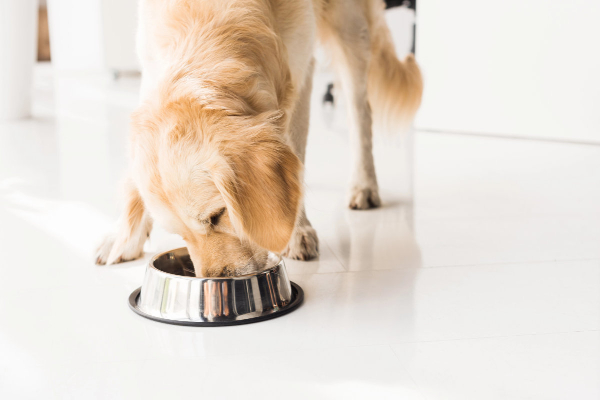Probiotics for dogs are great for managing GI upset. But did you know they can also help support the immune system, reduce anxiety, and play a role in weight loss? Integrative veterinarian Dr. Julie Buzby explains the many ways probiotics can help your dog, gives tips for picking a good probiotic product, and answers some FAQs about probiotics.

Probiotics for dogs have been a go-to treatment for various digestive illnesses for many years. But researchers and clinicians are now recognizing that probiotics have a wide array of benefits that extend far beyond the digestive system itself.
What could this mean for your dog? Buckle up and come explore the wonderful world of probiotics.
What are probiotics for dogs?
Probiotics are bacterial microorganisms (“good bacteria”) that live in the gastrointestinal tract or are introduced into it through dietary supplementation. Among other things, they help regulate digestive health and support immune function.
What are the benefits of probiotics?
Some of the most well-known benefits of probiotics are in the area of gut health. They include:
Blocking the growth of harmful bacteria
One of the primary roles of probiotics is to protect the body by inhibiting the overgrowth of harmful bacteria that enter the digestive tract like Salmonella and Escherichia coli. The beneficial bacteria in probiotics compete for the same nutrients that could allow harmful bacteria to flourish.
Limiting the availability of nutrients helps prevent these dangerous microbes from overpopulating the gut and causing inflammation and infection.
Regulating bacterial microflora
The other primary role of probiotics is helping reestablish populations of good gut bacteria if digestive issues develop due to:
- Grooming, boarding, or anesthesia (common triggers for stress colitis in dogs)
- Treatment with oral antibiotics (which may kill good bacteria too)
- Dietary indiscretion (like eating table scraps or getting into the trash)
- Chemotherapy in dogs diagnosed with cancer
Improving fecal consistency in dogs with diarrhea
If a dog has diarrhea but is acting fine, vets now tend to prescribe probiotics plus a bland diet for dogs rather than oral antibiotics like metronidazole. Pet owners can expect this trend to continue in veterinary care since we know the overuse of antibiotics has led to an increase in cases of antibiotic resistance.

Probiotics are certainly great for the digestive system. But their benefits extend far beyond simply supporting a healthy gut. Probiotics also help the immune system. Plus, numerous studies have demonstrated the vital connection between gut, brain, and skin health.
Supporting the immune system
Since 70% of the immune system is located in the gut, probiotics play a role in immune health by supporting the gut-skin axis, the gut-brain axis, and other vital organ systems including the kidneys and liver.
Increasing the amount of immunoglobulins puppies receive through the colostrum
Giving probiotics to pregnant dogs can boost the immunoglobulin (Ig) levels in the colostrum (first milk) they produce. When a newborn puppy receives these “immunity proteins” through the mother’s milk, they support the puppy’s immune system during the first weeks of life and help provide protection against diseases before the puppy can be vaccinated.
Reducing anxiety
The Bifidobacterium longum BL999 strains of probiotics are beneficial for reducing anxiety by influencing the gut-brain axis.

Promoting urinary system health
Certain strains of probiotics are beneficial for urinary tract health. Azodyl™ is a supplement containing a proprietary blend of Streptococcus thermophilus (KB19), Lactobacillus acidophilus (KB27), and Bifidobacterium longum (KB31) designed to support kidney and urinary tract health.
Reducing allergy symptoms like licking paws
Because of the connection between gut health and skin health (the gut-skin axis), probiotics can help relieve chronic skin and ear problems due to seasonal allergies in dogs. (But they are not effective as the sole treatment for allergies.)
Assisting in weight management
A 2024 study on the role of probiotics in weight loss in dogs demonstrated that Bifidobacterium lactis (IDCC 4301) and Enterococcus faecium (IDCC 2102) increase a dog’s metabolism, promoting weight loss even in the face of a high-fat diet.
How do you pick the right probiotic for your dog?
With all these great benefits, starting your dog on a probiotic supplement may be sounding better and better. But before choosing one, it is important to keep these guidelines in mind.
1. Consult your veterinarian
You should seek your veterinarian’s recommendation when picking a probiotic since they know your dog’s health history. Plus, your vet may already have a few “favorite” probiotic brands that he or she has found safe and effective.
2. Choose the right formulation—powdered is usually best
Powdered probiotics are usually the best choice due to their low moisture content. Many powdered probiotic options are packaged as sprinkle capsules or in individual packets for daily use.
You can also find probiotics available as chewable tablets, capsules, pastes, or liquids, but they have some limitations to be aware of. Liquids may not offer the same shelf life as dry forms, and often require refrigeration for the probiotic strains to remain viable. Chew treats usually contain lower numbers of viable cultures due to the manner in which they are processed.
TIP: Avoid purchasing probiotics as the first stop on your errand day and leaving them sitting in your hot car. Chances are, that will diminish the efficacy of the product you purchased, rendering it less beneficial for your dog.
3. Consider how the probiotic was prepared and packaged
As we just discussed, high heat and moisture can destroy the viability of the organisms in a supplement. Look for products that have been freeze-dried and contain minimal inactive ingredients. You should also check the ingredient list for added flavoring (like chicken or beef liver protein), which could be an issue for a dog with known dietary sensitivities or food allergies in dogs.
4. Evaluate the CFUs/serving
Ideally, a high-quality probiotic supplement should contain between 1 and 10 billion CFUs (colony forming units—a way to measure bacteria) per day, depending on the strain(s) included in the product. Manufacturers often include an oversupply of specific strains to compensate for the inevitable loss of some live organisms during the product’s shelf life.
5. Find the optimal number of strains
Usually, multiple culture strains (Proviable® Forte, Advita™, Fortiflora® PRO) are more effective than supplements with a single strain (Fortiflora®). However, as the number of strains in one probiotic product increases, there is a chance that your dog may experience side effects like excessive gas or diarrhea. Finding the perfect probiotic can sometimes take a bit of trial and error.
6. Select the best probiotic strain(s) for your dog’s condition
Using probiotics for dogs with diarrhea or other digestive difficulties is common. However, there are also specific probiotic products your veterinarian may recommend to help reduce anxiety (FortiFlora® Calming Care) and improve kidney health (Azodyl™).
Some of the most common strains of probiotics and their benefits include:
- Bacillus coagulans – Improves fecal consistency, decreases fecal odor, and optimizes nutrient absorption for smaller fecal output (smaller stools).
- Bifidobacterium animalis (AHC7) – Helps resolve acute diarrhea.
- Bifidobacterium bifidum – Supports the development of the immune system in young puppies, increases nutrient absorption in the gut, and supports kidney function to slow the progression of renal failure.
- Bifidobacterium lactis (IDCC 4301) – Helps with weight management in overweight dogs.
- Bifidobacterium longum – One strain, BL999, has been documented to help relieve anxiety. KB31 is part of a proprietary strain (Kibow Biotics) found in Azodyl™ a supplement often recommended for use in kidney failure in dogs (or cats).
- Enterococcus faecium (IDCC 2102) – Helps with weight management in overweight dogs in conjunction with B. lactis.
- Lactobacillus acidophilus – Regulates stool quality.
- Lactobacillus casei – Beneficial in easing allergy symptoms in dogs, including recurrent otitis (ear infections in dogs) and yeast infections on the skin. L. casei also aids in the digestion of proteins and carbohydrates in the diet, which may trigger allergic reactions.
- Lactobacillus plantarum -The postbiotic metabolites of this organism are beneficial for dogs’ oral health.
- Lactobacillus rhamnosus (LGG) – This strain is effective for treating human diarrhea. Some studies have indicated it may also benefit dogs.
7. Choose quality over convenience or cost
Look for dog-specific probiotic products formulated or recommended by veterinarians or veterinary nutrition experts. Products with trust symbols such as “GMP-compliant” or “NASC-approved” are great options since they undergo rigorous third-party testing to ensure the products meet their label claims. The label should also indicate a guaranteed amount of active cultures in each product.
It’s important to check the product labels for customer support contact information too. If your dog has an adverse reaction to a probiotic, the company should have a dedicated customer support team to help you support your dog through his or her issue.
Your call will also alert the company to product formulation or packaging issues that may need reevaluation using their individual quality control protocols.
How quickly will I see the effects of probiotics for my dog?
Probiotics typically begin to relieve digestive upset within a couple of days of starting the supplement. However, if you don’t see improvement or your dog’s symptoms worsen, please speak to your veterinarian.
Depending on the situation, he or she may recommend pursuing additional diagnostics or treatments. Or perhaps the vet will suggest switching to a different probiotic supplement. As we’ve seen, probiotics are not one size fits all. If one brand isn’t effective, it doesn’t mean none of them will be helpful.

For non-GI problems, probiotics have effects that are harder to see and evaluate. It is pretty obvious when your dog stops having diarrhea. But you can’t necessarily look at your dog and clearly know that his or her immune system, skin, or urinary system have benefited from the probiotics. They may well still be working behind the scenes, though.
What about prebiotics and postbiotics for dogs?
“Probiotic” is a term you’re probably very familiar with by now. But, you may have also heard the terms “prebiotic” and “postbiotic” tossed around. Each plays a vital role in the digestive process, but those roles are very different. In short, probiotics (good bacteria) digest prebiotics to make postbiotics.
We have already discussed probiotics, so let’s take a look at their buddies—prebiotics and postbiotics.
Prebiotics
Prebiotics are complex carbohydrates that provide nutrition to support the overall health of gut bacteria. They are usually found in starchy, fibrous foods. Examples of prebiotic foods that are safe for dogs include:
- Apples (NOT the core or the seeds)
- Asparagus
- Bananas
- Barley
- Chicory root
- Psyllium fiber
- Canned pumpkin for dogs (NOT pumpkin pie filling)
Prebiotics are also included in several veterinary prescription (Rx) and over-the-counter (OTC) diets that target gastrointestinal health. A few of the more popular foods include Royal Canin® Gastrointestinal Low Fat Diet (Rx), Purina® ProPlan® Veterinary EN Gastroenteric® (Rx), Hill’s® Prescription Gastrointestinal Biome (Rx), and Hill’s® Science Diet Perfect Digestion (OTC).
Postbiotics
Postbiotics are the byproducts created when microorganisms present in the gut ferment (break down) prebiotics. Some postbiotics include short-chain fatty acids (butyric, lactic, propionic acids) and peptides, which are essential for aiding digestion and enhancing immune function.
Probiotic FAQs
You can find the answers to some additional questions that tend to come up regarding probiotics for dogs below.
Can dogs take human probiotics?
No, human probiotics are not recommended for use in dogs. Different bacterial strains exist in the dog and human microbiomes. So, while safe, human probiotics may not be appropriate or beneficial for a dog’s intestinal tract. Dog-specific probiotics are much more effective.
Do puppies need probiotics?
Typically, puppies do not need probiotics, especially if you feed your puppy a commercially balanced, appropriate lifestage diet.
However, a short course of probiotics may help a puppy overcome acute digestive upset from stress, parasites, viral gastroenteritis (like parvo), switching diets, or dietary indiscretion (eating things they should not, which puppies are famous for doing).
Can I give my dog yogurt or kefir as a probiotic?
Yogurt and kefir can be helpful as a short-term treatment for GI upset as long as you keep a few precautions in mind. It is usually ok to offer your dog small amounts of plain Greek yogurt until you can get a suitable pet-specific probiotic product. Plus, you will want to have your dog on a bland diet too.
However, do NOT give your dog yogurts that are artificially flavored, heavily sugared, or sugar-free (those that contain xylitol or birch sugar, which are toxic to dogs). Also, keep in mind that the lactose in yogurt can cause further GI upset in some dogs.

Can I give my dog canned pumpkin as a probiotic?
You can give canned pumpkin to dogs, but it isn’t a probiotic. Pumpkin puree acts as a prebiotic—it provides a source of fiber to feed the microorganisms in the gut.
If you have canned pumpkin handy and want to give it to your dog, ensure it is 100% pumpkin puree, NOT pumpkin pie filling.
Are there side effects to probotics?
Some dogs may develop symptoms such as flatulence, bloating, or diarrhea after taking probiotics, especially with long-term use. However, probiotics can be given for weeks to months for conditions like chronic GI issues or to support the immune system in immunosuppressed patients.
Thus, it is best to check with your vet about any new symptoms or side effects your dog is experiencing. Also, before using them continuously or on an ongoing basis, have a discussion with your vet about whether long-term use of probiotics might be appropriate for your dog’s health needs.
There are a lot of “pros” to probiotics
Probiotics have many benefits for your dog. They promote a healthy GI tract, help your dog recover from GI problems, support the skin, immune system, and urinary system, relieve anxiety, and much more. So what’s not to love about them?
However, understandably, navigating the world of veterinary supplements can be overwhelming. Look at any pet-related retail website, and you’ll find dozens, if not hundreds, of probiotic products claiming to be “perfect” for your dog. There are many good products out there, but also some not so great ones.
When it comes to picking a probiotic for your dog, remember the considerations we discussed. And most of all, rely on your vet to guide you to tried and true, trusted products with quality ingredients and a proven track record of benefits.
What changes have you noticed in your dog after starting probiotics?
Please comment below.

